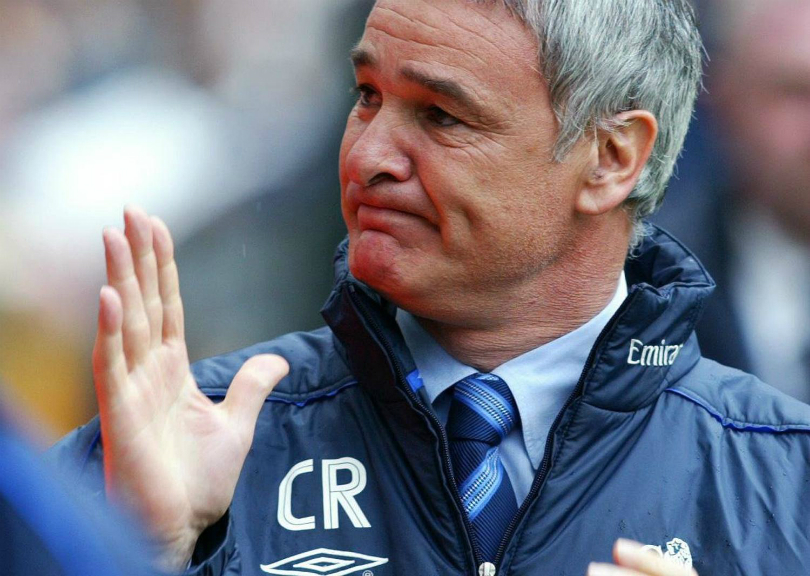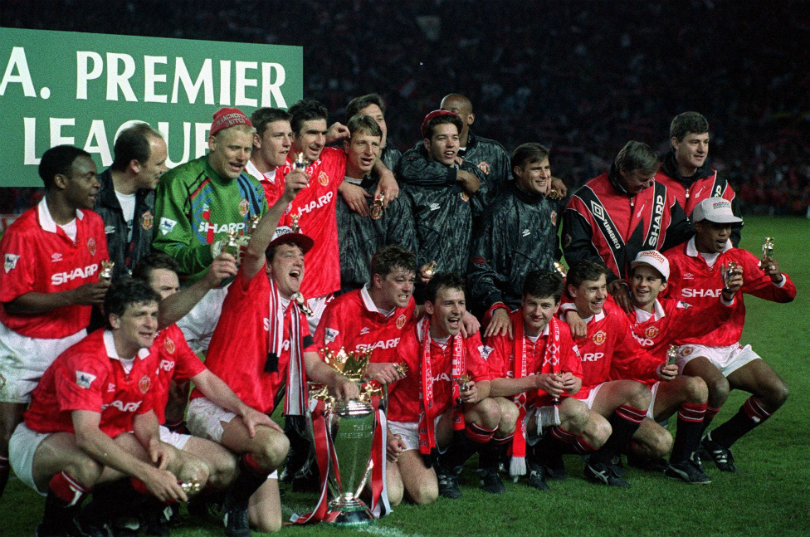Leicester demonstrate advantages of unchanged XIs – but can the traditional elite afford to reject rotation?
Claudio Ranieri has consigned his Tinkerman tag to history by defying all expectations this season, so, Richard Edwards asks, is this the beginning of a new era of settlement?

There’s nothing more uplifting for a club or a city than the scene of your team’s flag flying proudly from the passenger window of a Ford Focus – and there was plenty of that in evidence outside the King Power Stadium last Monday night as Leicester City fans revved their engines, wound down their windows and partied like it was 1999.

That, incidentally, was the year before Claudio Ranieri took over at Chelsea. At Stamford Bridge, the Italian was known as the Tinkerman and it’s easy to see why. Just once in his three-and-a-half year spell in west London did the Italian pick an unchanged side – a far cry from the policy he has adopted with such stunning success this season.
Rotation revolution
When Ranieri arrived at Chelsea, however, he inherited a squad disillusioned with the constant revolving-door approach taken by his predecessor, Gianluca Vialli. Speaking almost exclusively through an interpreter in his opening press conference with the club, though, Ranieri made it clear that he was in favour of picking players in form week in, week out.
At the start of an era that would come to be defined by the rotation of playing resources, Manchester United had used 11 different centre-back pairings in the first two months of the 2000/01 season.
“They might change from one game to the next, but it’s only logical that if you stick with the same 11, 12 or 13 players, they will know the tactics by memory,” he said. “If you change too often, players will not be able to find each other with their passes.”
One can only assume, then, that the Chelsea players of that era were a complete shower in training because, realistically, only Frank Lampard, William Gallas and Gianfranco Zola were anything approaching automatic picks during his time at the helm.
It wasn’t just Chelsea constantly juggling their pack back then, however. At the start of an era that would come to be defined by the rotation of playing resources, Manchester United had used 11 different centre-back pairings in the first two months of the 2000/01 season.
Get FourFourTwo Newsletter
The best features, fun and footballing quizzes, straight to your inbox every week.

“Rotation is the type of word that would have sent a shudder down the spine of the late Bill Paisley, the former Liverpool manager, whose plain-speaking approach extended to a belief that ‘negatives and positives are for electricians, not footballers’,” wrote Oliver Kay in The Times shortly after the Italian was handed the Chelsea job. “But in recent years it has become as much a part of the game’s vocabulary as misconduct charges and Super Sunday.”
Keep it lean
In the 15 years that have followed, little has changed. Until now.
As rotation became the accepted way of ensuring freshness and success, 11 league winners between 1998/99 and 2013/14 made over 100 starting 11 alterations.
Ranieri’s title-winning Leicester side has featured just 20 players so far this season, and the Italian has only made 27 changes to his starting XI since the season kicked off in August. It’s an astonishingly low figure, but one which is likely to feature high on the list when it comes to considering the main takeaways from their 5,000-1 success.
Only the Manchester United side of 1992/93 – the very first season of the Premier League – made fewer changes. As rotation became the accepted way of ensuring freshness and success, 11 league winners between 1998/99 and 2013/14 made over 100 starting XI alterations.

So, following the Foxes’ triumph, has rotation gone full circle?
At Leicester, everyone knows their role in the side and everyone feels completely secure in themselves
“The constant theme of all the top clubs nowadays – and that’s largely down to the size of the squads these teams have, too – is to change the side on a regular basis,” says former midfielder-turned BBC pundit, Kevin Kilbane.
“At Leicester, everyone knows their role in the side and everyone feels completely secure in themselves as they go onto the pitch.
“Every single player, when they are actually playing in games, knows where their team-mates are – they know if they make a run or if they’re out of position they’re going to be covered. You can really see that when Leicester play, it’s absolutely clear.”
Take it from cricket
Research by Sheffield Hallam University found that between 1987 and 1999, England made 368 changes to their Test side in just 130 matches, winning only 26 (or 20%) of those fixtures.
What’s more hazy is the link between Leicester’s selection consistency and the club’s eventual success. There has been little in the way of academic research into the subject, although it’s possible to draw parallels between the upturn in fortunes of the England cricket team post-2000 and the Foxes’ title charge.
Research by Sheffield Hallam University found that between 1987 and 1999, England made 368 changes to their Test side in just 130 matches, winning only 26 (or 20%) of those fixtures.
Between 2000 and 2012, they changed just 263 players in 166 matches and, in contrast, won 45% of these games.

“It’s very hard to prove that one is related to the other,” Steven Bullough, a research fellow at the Sport Industry Research Centre (SIRC) at Sheffield Hallam University, tells FFT. “If you look at Leicester, the same players have been consistently performing and have looked fresh as a result of being able to focus, almost entirely, on the Premier League.
“Everything has fallen into place for Leicester this season and no one has really challenged them.
I think we might see teams being a little bit more consistent in their selection from next season because Leicester have really shown what’s possible.
“A lot of clubs have core players, say five or six, who rarely get rested and will play every week if they’re fit. You’ve got the other half of the team that will be rotated – usually the wide players, the full-backs, occasionally the goalkeeper – but I think we might see teams being a little bit more consistent in their selection from next season because Leicester have really shown what’s possible.”
Back to the future
That would represent a fundamental shift and a genuine step back in time. It might also represent a team’s best chance of future success.
It might not be comparing 2015/16 eggs with those laid in the 1960s but when the likes of Bobby Charlton, Denis Law and George Best were inspiring Manchester United to the title in 1964/65, 11 players made over 36 appearances in a 42-game season, and four were ever-present from August to May.
Admittedly squads weren’t chock full of highly paid foreign talent, all vying for a place in the starting XI on a weekly basis, but Kilbane believes that even in an era when players are under immense physical strain, most would rather play a run of games than be rotated.
“The majority of players prefer to know that they’re playing every week,” he says. “Just from a mindset perspective, you know that if you play well one week you’re going to play the next.

“If you play well one week and are then left out then that does you no favours. I think the relationships you have on the pitch are essential – at both the bottom end and top end of the table.”
Doing it again
The toughest test for Leicester, of course, will come next season when they attempt to retain their title with the additional distraction of Champions League football.
Leicester, this season, haven’t had too many distractions. When you don’t have those there’s a lot to be said for the consistency approach
That additional congestion – a guaranteed six fixtures before Christmas and then who knows how many more if the Foxes' dream run goes on – will not only place Leicester’s resources under a huge amount of strain, but also test the resolve of Ranieri to continue what he has started.
“Leicester, this season, haven’t had too many distractions,” says David Fletcher, senior lecturer in Performance Psychology and Management at Loughborough University. “When you don’t have those there’s a lot to be said for the consistency approach for various reasons.
“One of them is the team dynamic and people getting to know each other – but not just as players; how they like to play, their strengths and weaknesses, and how you work together. You also get to know them as human beings and team-mates, and when you go through adversity together that’s also a factor.

“I think some of those Leicester players would look back on last season and acknowledge that it was a really tough time. They came out the other side and there’s a lot that can be said for that.
“Where possible, managers should be looking for a relatively consistent approach and a core set of players that they rely on week in, week out. The merits of rotation, meanwhile, come in when you have a bigger fixture list. You need a squad that can accommodate European football, and that’s a whole new level.”
Ranieri’s selection policy has already put domestic opposition in a spin – the main question now is whether rotation, like the accepted norms of the modern-day English game, is about to be consigned to history as well.
The BBC will provide extensive live coverage of the FA Cup final between Manchester United and Crystal Palace on Saturday, May 21 at 5:30pm across BBC One, Radio 5 live and the BBC Sport website

